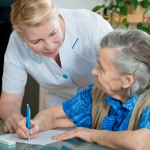Accueil >
Elderly Health Care > Other Age-Related Health Conditions
Chronic Obstructive Pulmonary Disease, or COPD, is a progressive and debilitating lung condition that primarily affects the elderly. It's a complex respiratory disorder that combines two primary conditions: chronic bronchitis and emphysema. With COPD prevalence increasing with age, understanding its impact on the elderly and the strategies for management is crucial.
 The aging factor:
The aging factor:COPD has a close association with aging. As people grow older, the cumulative effects of exposure to lung irritants, such as smoking and environmental pollutants, take their toll. Long-term exposure to these irritants damages the lungs and airways, leading to the development of COPD.
COPD manifests a range of symptoms, which often worsen over time. The most common signs in the elderly include:
Ask questions regarding retirement homes to our experts
While there is no cure for COPD, there are several strategies for managing the condition and improving the quality of life for elderly individuals:
1. Smoking cessation: If the individual is a current smoker, the most effective step is to quit smoking to halt the progression of the disease.
2. Medications: Bronchodilators and inhaled corticosteroids are often prescribed to improve airflow and reduce inflammation in the airways.
3. Pulmonary rehabilitation: Pulmonary rehabilitation programs can help individuals learn breathing techniques, improve exercise tolerance, and better manage their symptoms.
4. Oxygen therapy: In severe cases, supplemental oxygen therapy may be necessary to ensure adequate oxygen levels in the blood.
5. Vaccinations: Influenza and pneumonia vaccinations are recommended to prevent respiratory infections that can worsen COPD.
6. Lifestyle changes: Encouraging a healthy lifestyle with regular exercise, a balanced diet, and weight management can significantly improve an individual's overall health and well-being.
7. Advance care planning: For those with severe COPD, it's important to discuss and document preferences for end-of-life care, as the disease can progress and impact daily life significantly.
COPD management in the elderly is a multidisciplinary effort involving healthcare professionals, family support, and the affected individual. Early diagnosis, a commitment to treatment, and a focus on maintaining a good quality of life are crucial in addressing the challenges posed by this chronic lung condition in the elderly.
Don't hesitate to contact us at 343 309 5289 . We can help you choose the right establishment for you and assist you in your search.

Find a suitable senior residence